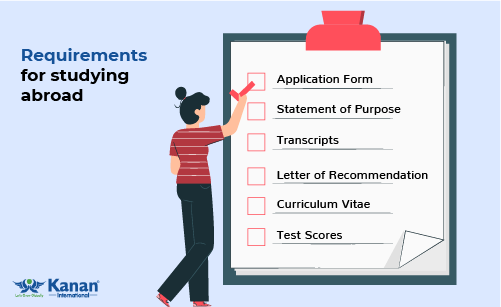
Have you found your preferred major and university abroad? Happy! Next, all you have to do is look for information about the university’s entry requirements.
In general, the requirements for entering universities abroad for undergraduate or undergraduate degree level are divided into three:
- English language proficiency requirements
- Academic requirements
- Supporting requirements
If you are sure that you will continue your undergraduate education abroad, it would be a good idea for you to prepare yourself starting from high school. It doesn’t matter if you don’t come from an international high school, but there are several ways that may be slightly different from international high school graduates in order to be accepted at universities abroad.
Entry requirements may vary between departments, even if they are at the same university. These requirements are determined by the institution concerned to ensure that you do not have difficulty attending lectures later. See some of the points below which are general requirements for studying undergraduate abroad:
1. English Language Proficiency Requirements
To prove your English language skills, you need to take an English fluency test that is recognized throughout the world. In general, the test certificate most often requested by higher education institutions abroad is IELTS (International English Language Testing System). Universities outside the UK also accept TOEFL
The IELTS test in Indonesia is held by many organizers ( one of which is IDP Indonesia ) and is also held several times a year. Usually the minimum score required by universities is 5.5, 6 to 7 (depending on the major and university). The following is a table of the IELTS score criteria required by most universities in the world’s leading study destination countries:
|
Country |
Minimum IELTS Score for Undergraduate Level (S1) |
|
New Zealand |
5.5 – 6.5 |
|
Australia |
6.5 – 7.0 |
|
UK |
6.0 – 6.5 |
|
Canada |
6.5 |
|
Ireland |
6.5 |
If you need preparation before taking the IELTS test, you can take preparation classes or courses held by many foreign language courses. Therefore, it is recommended to determine your college major as early as possible, so that you have enough time to take test preparation classes and take tests.
2. Academic Requirements for Undergraduate Study Abroad
-
Diploma/Transcript
International students who wish to continue their studies abroad need to complete a certain level of education in order to be accepted at a higher education institution in the destination country. Generally, international students must be able to show proof through diplomas and transcripts that they have completed 12 years of education or equivalent (e.g. high school), including primary and secondary education.
This school diploma and transcript will be a reference for universities abroad to assess the academic abilities of prospective students. If you already have an international qualification such as A -level , International Baccalaureate Diploma or other equivalent qualification.
However, if you don’t have these qualifications, there’s no need to be afraid. You also still have the opportunity to be accepted at a foreign university. However, you must ensure that your diploma and transcript have first been translated into English before being submitted to the destination campus.
Transcript delivery methods vary depending on the destination university’s requirements, but there are generally three common ways to send transcripts: online, by post, and by certification by a third party.
-
Academic CV
A CV (curriculum vitae) or resume usually lists academic and professional experience. Universities will usually look at whether previous experience relates to the program you want to take, not a detailed description of all your work or extracurricular activities. If there is experience that is not relevant, it is better to remove it from the CV.
In your CV, focus on points such as publications of academic papers, work in academic groups (paid or unpaid), and relevant volunteer activities. Don’t forget, explain clearly in the Personal Statement if there are study gaps that cannot be avoided.
-
Statement of Purpose (Personal Statement)
A personal statement is important to show who you are and why you are a good fit for a particular course at your chosen university. Share your roots, your accomplishments, and your life influences to convince the university that you can make a valuable contribution to their learning environment. The way to write a personal statement and a motivation letter is quite different, so make sure you know both formats well.
-
Portfolio
It is important to remember, especially for creative majors such as art and design, music, architecture, and the like, that you may need to include a portfolio. A portfolio is basically a collection of work that shows your abilities, personality and creativity. A portfolio should tell your journey from beginning to end, from what you have learned and created to what you want to do in the future.
You can read complete tips for compiling a portfolio here . Also make sure to read brochures or information on the university’s official website before compiling a portfolio. Usually, universities will provide specific guidance regarding portfolio preparation, so it is important to pay attention to this information so that your portfolio meets their expectations.
- Letter of recommendation
A letter of recommendation is a letter in which the writer describes and provides assurance regarding the skills, traits, and overall qualities of the recommended student. This letter can come from a professional, academic, or personal perspective. For undergraduate level, you can ask a teacher who knows you well at school to write a letter of recommendation to study at your target study program and university.
3. Supporting Requirements
Apart from preparing various documents related to academic and English language requirements, you also need to prepare various important documents that will be needed when studying abroad. The following are several important documents that you must prepare:
-
Valid passport
A valid passport is very important in preparing to study abroad. A passport is not only a form of personal identity, but is also a document required for the visa process. With a valid passport, students can move to the next stage in their study journey, including processing student visas and travel plans to their study destination. Having an up-to-date passport is a crucial first step in ensuring the legality and smoothness of academic travel abroad.
-
Financial proof
To be able to apply for a student visa that will allow you to go abroad to study, most study destinations will ask for financial proof in the form of savings or deposits to ensure that you are able to pay the tuition fees and living costs while studying in that country. So prepare savings well in advance if you want to study abroad. You can try various overseas undergraduate scholarships to get tuition fee relief.
-
Student visa
This is the last step you have to take care of before you can leave for your Bachelor’s degree abroad. This document is MANDATORY if you want to travel legally to your future study destination to study.
What if you don’t meet the entry requirements of a foreign university?
If you don’t meet the required entry requirements, or any of them, you can take a foundation program or another entry route (depending on advice from the university). This might happen if you come from a non-international high school and don’t have Cambridge or IB qualifications which are usually an absolute requirement for acceptance to undergraduate studies abroad. So don’t worry, OK!
The foundation program (preparation for undergraduate studies abroad) only lasts for one year. If you complete it well, you can continue to graduate level in the following year.
There are also many universities or educational institutions that provide pathway programs , depending on your academic conditions, after completing the pathway program, you can immediately continue to the second year of undergraduate level at a foreign university that has collaboration with the pathway program you are following.
Conclusion
Studying abroad requires careful preparation, starting from preparation for English language tests such as IELTS or TOEFL, as well as academic documents such as transcripts and CVs. If you experience confusion in carrying out this preparation process, don’t hesitate to consult a counselor!





